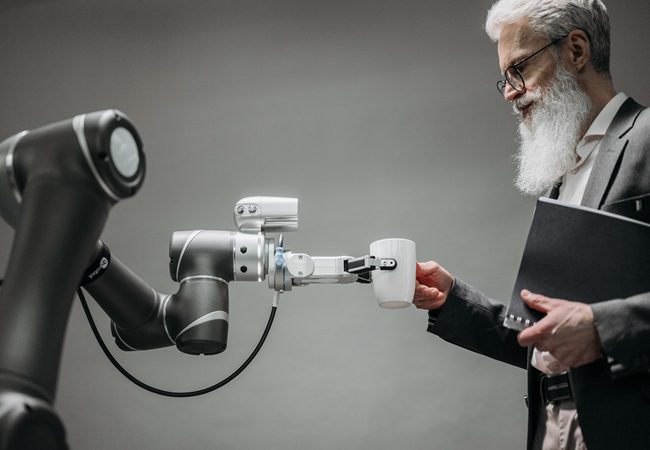Introduction:
In the ever-evolving landscape of education, Artificial Intelligence (AI) is emerging as a transformative force, reshaping the way students learn and educators teach. This article delves into the profound impact of AI on education, exploring the myriad ways in which this technology is revolutionizing classrooms, personalized learning, and the overall educational experience. As we navigate through the intersection of technology and learning, it becomes increasingly evident that AI is not merely a tool but a catalyst for innovation in education.
AI-Powered Personalization:
One of the significant contributions of AI to education is personalized learning. Traditional one-size-fits-all approaches are giving way to tailored educational experiences that cater to individual student needs. Through sophisticated algorithms, AI analyzes student performance data and adapts learning materials to match each student’s pace and style. This personalized approach ensures that no student is left behind, fostering a more inclusive and effective learning environment.
Additionally, AI-driven educational platforms can identify a student’s strengths and weaknesses, providing targeted interventions to enhance understanding and mastery of subjects. This not only optimizes the learning process but also empowers educators with valuable insights to refine their teaching strategies.
Enhanced Classroom Efficiency:
Artificial Intelligence streamlines administrative tasks, enabling educators to allocate more time to actual teaching and interaction with students. Automated grading systems, for example, reduce the time spent on assessing assignments, allowing teachers to focus on providing constructive feedback and individualized support.
Moreover, AI facilitates the creation of smart classrooms equipped with interactive learning tools. Virtual assistants and AI-powered educational apps engage students in real-time, creating an immersive and dynamic learning experience. As a result, the classroom transforms into a collaborative space where technology enhances, rather than replaces, the role of educators.
Revolutionizing Educational Content:
AI is revolutionizing the creation and delivery of educational content. With the ability to process vast amounts of information quickly, AI algorithms curate customized content based on individual learning styles and preferences. This not only makes learning more engaging but also ensures that students receive information in a format that resonates with them, whether it’s through visual aids, interactive simulations, or auditory explanations.
Furthermore, AI is breaking down language barriers in education. Translation tools powered by AI enable students from diverse linguistic backgrounds to access educational materials in their native languages, fostering inclusivity and equal educational opportunities.
AI in Special Education:
Artificial Intelligence is proving to be a game-changer in the realm of special education. Tailored learning programs designed for students with diverse learning abilities leverage AI to adapt content, pacing, and assessments to accommodate individual needs. Machine learning algorithms analyze patterns in student performance, allowing educators to make data-driven decisions that cater to the unique requirements of each student.
Moreover, AI-driven assistive technologies, such as speech-to-text and text-to-speech tools, empower students with disabilities to participate more actively in the learning process. These technologies not only level the playing field but also create a more inclusive educational ecosystem.
Preparing Students for the Future:
As the job market evolves with advancements in technology, AI is playing a pivotal role in preparing students for the future workforce. AI-based curricula expose students to emerging technologies, fostering digital literacy and critical thinking skills. This equips them with the competencies needed in a rapidly changing job landscape, where automation and AI are becoming integral parts of various industries.
Additionally, AI-powered career guidance tools analyze students’ skills, interests, and market trends to provide personalized career recommendations. This not only helps students make informed decisions about their educational paths but also ensures that they are well-prepared for the professional challenges that lie ahead.
Challenges and Ethical Considerations:
Despite the numerous benefits, the integration of AI in education is not without challenges. Privacy concerns, data security, and the potential for algorithmic bias are critical issues that need careful consideration. Striking a balance between the efficiency of AI-driven systems and safeguarding sensitive student information is crucial to building trust in these technologies.
Moreover, there is an ethical responsibility to address issues of equity and accessibility. Not all educational institutions have equal access to AI technologies, potentially creating a digital divide. Ensuring that AI is deployed in a manner that promotes inclusivity and addresses existing educational disparities is imperative for the ethical advancement of AI in education.
The Future Landscape:
As AI continues to evolve, the future of education holds exciting possibilities. Virtual reality (VR) and augmented reality (AR) powered by AI are on the horizon, promising immersive learning experiences that transcend the boundaries of traditional classrooms. AI may also play a pivotal role in developing adaptive assessments that provide real-time feedback on student progress, allowing educators to tailor instruction more effectively.
Conclusion:
The impact of Artificial Intelligence on education is profound and far-reaching. From personalized learning experiences and enhanced classroom efficiency to the preparation of students for the future job market, AI is shaping the future of learning in unprecedented ways. As we embrace these technological advancements, it is crucial to navigate the challenges responsibly, ensuring that AI in education remains a tool for empowerment, inclusion, and the enrichment of the learning journey. The synergy between human educators and AI holds the key to unlocking the full potential of education in the 21st century.



































